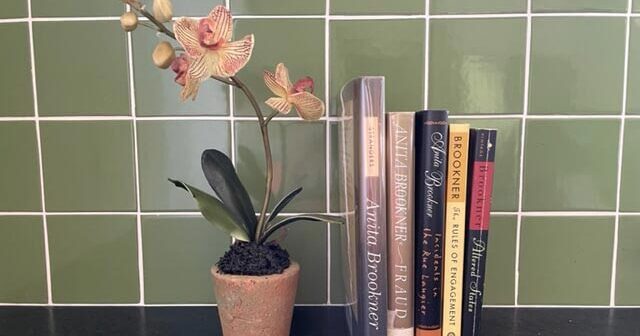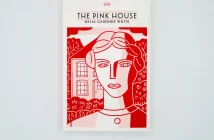Do you know of anyone who wrote twenty-six novels after a successful career as a professor and art historian? Or who won the prestigious Booker Prize for her fourth novel? All that is true of British author Anita Brookner (July 16, 1928 – March 10, 2016), which is why I enjoy her books so much — she entertains as well as educates.
I liken Brookner’s beautifully crafted stories to fine needlework, and I’ve recently started collecting her books, as I know I will reread them over the years.
Surprised by the Booker Prize; a prolific career
I discovered Anita Brookner in 1984 when she won the Booker Prize for Hotel du Lac, the story of a romance writer who commits an indiscretion and heads to Switzerland to sort herself out.
In researching Brookner’s life, one favorite moment was watching the BBC clip from the award ceremony where she sat at a table with other nominees, including J.G. Ballard (whose book Empire of the Sun was favored) and Julian Barnes.
When Brookner’s name was announced, she seemed utterly gobsmacked, made a short acceptance speech, and sat down again. Many critics thought her book was undeserving; however, the judges found her prose stellar, the plot ironic and witty. In all, the novel was deemed “a work of perfect artifice.”
For someone who was born at a time when females were judged by whom they married and what kind of mothers they were, she left a different mark. Brookner was an eminent art historian and professor who also wrote three respected tomes on the painters Greuze, Watteau, and David.
To this list, Brookner added more than two dozen novels (some romans a clef) numerous articles, and an e-book written near the end of her life.
She produced a novel a year for two decades, won many awards, including a Commander of the Order of the British Empire (one tier down from knighthood), and was nominated for a second Booker Prize for her novel The Next Big Thing (2002). (An elderly man is trying to decide on the final chapters of his life — should he travel? Should he marry?)
Early life and education
Anita Brookner was born in Herne Hill, a suburb of London, to Polish Jewish emigres in 1928. The family surname of her parents, Newson and Maude, was originally Bruckner. Her father decided he didn’t want to have a Germanic name in the World War I era, hence the change.
Her mother, Maude, was a professional classical singer. Her father fought in World War I for Britain. After the war, he started his own businesses, none of which were successful; he ended up working for his wealthy father-in-law, who owned a tobacco factory.
The Brookners lived in a villa with various relatives as well as refugees they’d taken to work as family servants. Anita was an only child. Her parents had a rocky marriage — her mother felt she had married beneath her — perhaps why missed signals, angst between the sexes, and the outsider status of foreigners figure so prominently in Brookner’s canon.
Despite his business problems, her father ran a lending library for a time, introducing his young daughter to classic authors like Charles Dickens and H.G. Wells. From a young age, Anita understood the joy and power of the written word.
Anita attended a girls’ school in Dulwich, then earned a bachelor’s degree in history from King’s College of London. Disliking most of her courses, she attended lectures at the nearby National Gallery and was enthralled. A lecturer noticed her interest and suggested she switch her focus to art history, much to her family’s chagrin.
Remember that all this took place at a time when a woman’s goal was to find a suitable husband. But Anita Brookner had other ideas. She changed her studies to art history and pursued a doctorate for several years at the Sorbonne. Her parents’ response to their independent daughter was to cut her off.
A distinguished career teaching art history
Undaunted, she carried on. By 1959, Brookner was teaching art history at Reading University. In 1964, she joined the staff of the Courtauld Institute of Art, where she was considered an authority on 18th and 19th-century art. Much admired by her students, Brookner became the first female Slade Professor of Art at Cambridge.
As Brookner passed the age of fifty, she realized her life had taken a different turn, with no husband, no children, and much time spent taking care of her aging parents. When she began to write fiction at age fifty-three, she described it as having taken place “in a moment of sadness and desperation.”
“My life seemed to be drifting in predictable channels, and I wanted to know how I deserved such a fate,” she was quoted as saying in her New York Times obituary. “I thought if I could write about it, I would be able to impose some structure on my experience. It gave me a feeling of being at least in control. It was an exercise in self-analysis, and I tried to make it as objective as possible — no self-pity and no self-justification. But what is interesting about self-analysis is that it leads nowhere — it is an art form in itself.”
Notable novels and themes
Her first novel A Start in Life, whose main character is a lonely academic looking for a new hold on life, was published in 1981. Within three years she had won the Booker, England’s most prestigious prize for fiction.
Brooker writes about women, mostly, that are strong and interesting, but unlucky in love. They forge ahead anyway; usually the object of their affections is beneath them so maybe they will be better off.
Brookner’s themes embrace the trenches of life, the pas de deux between the sexes, and the interior life of the lonely. Hers weren’t cozy domestic novels, yet she has been compared to Jane Austen and Barbara Pym (in addition to Henry James).
Jonathan Yardley, former book critic for The Washington Post (and Pulitzer Prize winner) wrote, “Anita Brookner’s novels are miniatures containing within their brief space worlds of feeling, wisdom, and compassion, not to mention quiet, understated wit and seamless prose.”
In his book, Second Reading, Notable and Neglected Books Revisited (2011), Yardley says Brookner’s Look at Me was one of the finest novels written during the last 25 years.
One of the passages he cites in this book describes a lonely reference librarian who works in a medical research laboratory. She befriends a glamorous couple, to her detriment:
“What interested me … was their intimacy as a married couple. I sensed that it was in this respect that they found my company necessary: they exhibited their marriage to me, while sharing it only with each other. I soon learned to keep a pleasant noncommittal smile on my face when they looked into each other’s eyes or caressed each other; I felt lonely and excited. I was there because some element in that marriage was deficient, because ritual demonstrations were needed to maintain a level of arousal which they were too complacent, perhaps too spoilt, even too lazy, to supply for themselves, out of their own imaginations. I was the beggar at their feast, reassuring them by my very presence that they were richer than I was. Or indeed could ever hope to be.”
Added Yardley, “Brookner’s style of narrative – reflective, measured, expository – is, in her hands, exactly right; her prose alone, is quite simply, exquisite. I cherish her novels almost without reservation and I cherish Look at Me above all.”
An often misunderstood novelist
Julian Barnes, the novelist and a friend of Brookner’s, believes the critics and press, mostly males, seem to have misunderstood her work.
Dubbing her “Modest Anita” they decided to pigeonhole her as a lonely spinster whose life had not worked out and who consoled herself by writing novels, once a year, as a regular act of comfort. They also tended to ignore her brilliant career as an art historian.
“There is often a moral antithesis in her fiction,” observed Barnes, “opposing those who are virtuous, truthful, genteel, and stylish to those who are monied, course, and careless.” He also wondered if the press would not have been kinder to Brookner if she had published novels every two years rather than each year.
According to Barnes, Brookner refused to live the life of a literary celebrity. She wasn’t an aggressive self-promoter; if she went to a book signing event, she was more inclined to sign several copies and then leave before too many people showed up.
Her novels tend to be short, usually around two hundred pages. They engage the reader from the first line. Fraud (1992) begins, “When Anna Durrant disappears, it is months before anyone notices. . . “) Yet her plots are neither formulaic nor depressing. Some of her novels are written from a male point of view.
Anita Brookner’s legacy
Anita Brookner was a talented writer, a monument to hard work and discipline. She smoked a lot, read five newspapers a day, wrote in longhand, and her favorite novel was Ivan Goncharov’s Oblomov, a satiric story about a ne’er-do-well nobleman.
She didn’t ascribe to any religion; she had been raised in a secular Jewish family at a time when it was perilous to be Jewish in Europe. A stoic, she kept her private life to herself. She admitted that there had been marriage proposals over the years, just not the right ones. She always regretted not having children.
She once said of writing fiction, “I don’t like writing fiction much; it’s like being on the end of a bad telephone line – but it’s addictive.”
An excerpt from Hotel du Lac, arguably her best-known work:
“You are wrong if you think you cannot live without love. I cannot live without it. I do not mean that I go into a decline, develop odd symptoms, become a caricature. I mean that I cannot live well without it. I cannot think or act or speak or write or even dream with any kind of energy in the absence of love. I feel excluded from the living world. I become cold, fish-like, immobile. I implode. My idea of absolute happiness is to sit in a hot garden all day, reading or writing, utterly safe in the knowledge that the person I love will come home safe to me in the evening. Every evening.”
To read and enjoy Brookner, you have to be on alert: Don’t read her when you’re tired; you need to pay attention. The sentences are expertly laid out and she writes for smart readers who may yet have to look up the occasional word in the dictionary. Her characters may read Proust, think about Stendhal, wonder about Freud, or climb in bed with The Great Gatsby. If a character happens to be in Paris, she may even throw in a few simple French phrases.
Over the years Brookner has been called “the mistress of doom,” and was once asked if she was in love with melancholy. She responded, “I don’t think it’s melancholy. I think it’s seriousness. I think there’s a difference. I think people are frightened of seriousness.”
Anita Brookner died peacefully in her sleep in the spring of 2016 at the age of eighty-seven. She left money and paintings to her friends (she even owned a Manet sketch) and instructed her agent to keep any books, letters, and manuscripts, finished or unfinished, and to destroy the rest. She left the bulk of her estate to Doctors Without Borders, and her final wish, after donating her body to science and cremation, was not to have a funeral.
Contributed by Tyler Scott, who has been writing essays and articles since the early 1980s for various magazines and newspapers. In 2014 she published her novel The Excellent Advice of a Few Famous Painters. She lives in Blackstone, Virginia where she and her husband renovated a Queen Anne Revival house and enjoy small town-life.
Photo courtesy of Tyler Scott.



